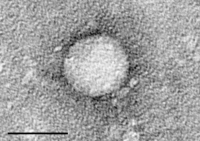
Photo from wikipedia
Hepatitis B virus (HBV) is a partially double‐stranded DNA virus associated with hepatocellular carcinoma (HCC). The viral integration into the hepatocyte genome, the viral protein‐induced oncogenesis, the increased hepatocyte turnover… Click to show full abstract
Hepatitis B virus (HBV) is a partially double‐stranded DNA virus associated with hepatocellular carcinoma (HCC). The viral integration into the hepatocyte genome, the viral protein‐induced oncogenesis, the increased hepatocyte turnover and the chronic inflammatory response towards HBV are all hypothesized mechanisms for the development of HCC. The fact that HBV infection and HCC prevalence show different correlations in various regions of the world indicates that there may be virus‐independent phenomena for cancer development in these regions. From this point of view, it is important to review our knowledge and to examine the relationship between HBV and HCC in the light of current data. In this article, we investigate the relationship between HBV and HCC by presenting epidemiological and microbiological data, accompanied by the principles of viral oncogenesis.
Journal Title: Journal of Viral Hepatitis
Year Published: 2021
Link to full text (if available)
Share on Social Media: Sign Up to like & get
recommendations!